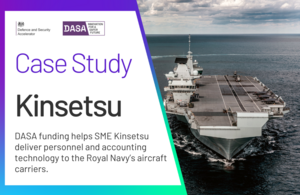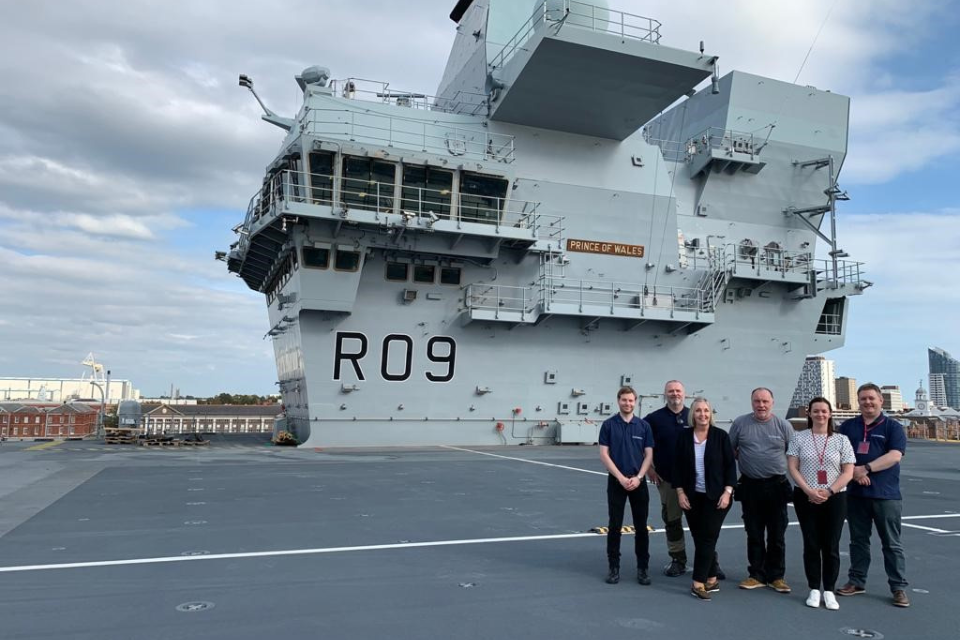DASA funding helps Northern Ireland SME deliver personnel and accounting technology to the Royal Navy’s aircraft carriers
Accelerated by DASA: Kinsetsu’s PAS Technology has been procured by the Royal Navy to improve personnel safety and security on both Queen Elizabeth Class Aircraft Carriers.

- Northern Ireland-based SME, Kinsetsu, has developed a resilient and scalable platform to accurately account for and locate personnel on Royal Navy ships, providing immediate insight of all souls on board, as well as visitors to ships.
- Funded through the DASA Themed Competition, Get the Ship in Shape, Kinsetsu’s innovation has been procured by the Royal Navy for use on board HMS Queen Elizabeth and HMS Prince of Wales.
- Kinsetsu had not previously worked with defence, but their DASA journey helped them realise the defence potential of their personnel accounting and locating innovation, and they now have a thriving defence-centric business.
Getting the Ship in Shape
Royal Navy vessels are highly complex and operate in extremely hazardous environments, with crews that can number into the thousands. However, navies around the world, including the Royal Navy, use a simple manual peg in/out board to record the number of people on board a ship. This system lacks digitalisation, which makes it difficult to efficiently locate and track personnel and visitors on larger vessels, such as the Queen Elizabeth Class Aircraft Carriers.
To ensure the safety of the crew, as well as visitors, a modern and reliable personnel accounting system (PAS) solution is vital to gain visibility of all souls on board a ship. In 2019 The Royal Navy and DASA launched the Get the Ship in Shape Competition to improve the accounting of personnel on board Queen Elizabeth Class vessels.
Introducing Kinsetsu: Intelligent tracking and location solutions provider
Female founded, Belfast-based SME, Kinsetsu, has developed a platform to accurately account for and locate personnel, providing a live view of all souls on board, as well as visitors.
Kinsetsu had enjoyed success providing accounting and locating technologies to the NHS, Government and Commercial sectors, but had never considered the defence potential of their technology. This was until DASA published the Get the Ship in Shape Competition, which helped them realise how the work they were already doing in NHS, Government and Commercial sectors could help drive safety within defence. The PAS solution was born.
Their innovation comprises a network of ruggedized deckhead and bulkhead-mounted terminals, placed at ingress and egress locations and high-traffic areas throughout a ship. The ship’s crew use their ID card at a terminal when they enter or leave the ship. Visitors are provided with a visitor card to capture arrival and departure, providing traceability of their visit.

The Kinsetsu team on board HMS Queen Elizabeth
Procured by the Royal Navy
Kinsetsu successfully submitted their idea to DASA’s themed competition, Get the Ship in Shape, where the innovation was initially trialled on HMS Bristol, and later both Queen Elizabeth class aircraft carriers, HMS Prince of Wales and HMS Queen Elizabeth. Kinsetsu’s innovation was up to the challenge, representing huge efficiency gains compared to the pegboard system, and was able to accurately account for personnel on both ships, which comprise crews of up to 1700 working across 8000 internal compartments.
As a result of the DASA trials, the innovation has now been procured by the Royal Navy for use on both aircraft carriers.
Lieutenant Will Thomas Capital Ships Weapon Engineer in the Royal Navy and project sponsor, said:
The PAS project has exceeded expectations; this capability is now providing positive evidence that technology can reduce the Risk to Life of Souls on Board and it was used as the primary accounting method on HMS Queen Elizabeth for her global deployment in 2021. To achieve this success on a strategic defence platform in a highly demanding environment is remarkable for any project; to get this far from a tech demonstration project so quickly is unheard of and has been the result of solid collaboration across defence organisations and suppliers.
Kinsetsu’s PAS solution helps defence in several ways:
- Ease of use: Similar to a train station ticket gate, uses simply use their ID card at a deckhead or bulkhead terminal and their location, entry and exit data is recorded
- Safety: The system has significantly reduced the time to muster in the event of an incident, improving safety for all who serve on these huge vessels
- Flexibility: Personnel and visitors can enter the ship at any point where a terminal is located, rather than a singular gangway with a pegboard
- Automatic updates: The solution enables historic reports of personnel movements, as well as automatic updates
- Multiple security case uses: This technology has multiple security uses such as for energy and nuclear sites, prisons, hospitals and blue light services
How DASA helped Kinsetsu build their defence business
DASA funding has had a transformative impact on Kinsetsu. At the time of submitting their first innovation to DASA, Kinsetsu was entirely focused on non-defence work and had 5 full-time employees, which has now risen to 25. Engaging with DASA provided a front door to defence, helping Kinsetsu build relationships with large defence suppliers, creating new revenue streams. The SME has tripled its turnover since starting their defence journey with DASA.
Co-founder Jackie Crooks said:
DASA has been invaluable in raising our profile and enabling access to the defence and security sector, which we could never have achieved on our own. Their collaborative approach, pairing us with subject matter experts from the Defence Science & Technology Laboratory (DSTL) and the Royal Navy, informed our deployment of the solution within the defence operating environment. PAS was delivered in three phases, each robustly and rigorously tested at scale, before being adopted as a production system by the Royal Navy. We are immensely proud of our journey from micro SME to scale-up, entrusted by the Royal Navy to enhance safety for all who serve at sea.
Kinsetsu is showing no signs of slowing down and is exploring new defence opportunities and collaborations with large organisations in the UK, Europe and North America. DASA funding and support have proved instrumental to these efforts, helping Kinsetsu, a micro SME from Northern Ireland, steer their business towards defence, and help engage directly with stakeholders within the military, and to find product champions in the Royal Navy.